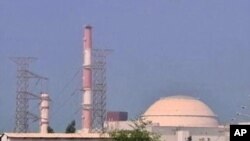WHITE HOUSE — The Obama administration says it is closely studying the new report by the International Atomic Energy Agency on Iran's nuclear program.
Press Secretary Jay Carney told reporters it is "not surprising" that Iran continues to violate its international nuclear obligations. He said Washington is studying the IAEA quarterly report, and he reiterated that the U.S. and its partners have what he called "eyes on" the Iranian nuclear program.
"We are closely studying the details of the report, but broadly speaking it is not surprising that Iran is continuing to violate its obligations," said Carney. "As the report illustrates, we are in a position to closely observe Iran's program and to detect any effort by Iran to begin production of weapons-grade uranium."
The IAEA report said Iran has more than doubled the number of centrifuges it is using to enrich uranium at an underground facility at Fordo, near Iran's holy city of Qom.
The agency says there are now 2,140 of the machines there, although it added that the new centrifuges are not yet in operation.
The IAEA also updates its report on the Parchin site, the focus of attention by the U.S. and key partners, after satellite photos showed intense above-ground activity thought to indicate efforts at concealment.
In light of these "extensive activities" the IAEA said its "ability to conduct effective verification will have been significantly hampered" when it does gain access to the location.
Iran says it is not attempting to develop a nuclear weapon and that its nuclear program is for peaceful purposes.
There has been intense debate and speculation in Israel about a possible Israeli strike on Iran's nuclear program, and condemnation of recent remarks by Iranian leaders threatening Israel's existence.
President Obama has said repeatedly that he is determined to prevent Iran from obtaining a nuclear weapon.
Carney reiterated that the president is also keeping "all options on the table," adding that while the window of opportunity for a diplomatic solution remains open, "it will not remain open indefinitely."
He had this additional response when asked if the U.S. continues to believe that an Israeli military strike on Iran's nuclear facilities can be prevented.
"There is time and space to resolve this diplomatically, and as I just said we have ability to see clearly, have eyes on developments in the Iranian nuclear program, and as I have said in the past we would know if they made a breakout move towards building a nuclear weapon," he said.
Carney said Iran's continued failure to work with the IAEA to resolve questions about its activities, and its refusal to "even conclude an agreement on the process to address these questions," underscores its lack of seriousness.
Press Secretary Jay Carney told reporters it is "not surprising" that Iran continues to violate its international nuclear obligations. He said Washington is studying the IAEA quarterly report, and he reiterated that the U.S. and its partners have what he called "eyes on" the Iranian nuclear program.
"We are closely studying the details of the report, but broadly speaking it is not surprising that Iran is continuing to violate its obligations," said Carney. "As the report illustrates, we are in a position to closely observe Iran's program and to detect any effort by Iran to begin production of weapons-grade uranium."
The IAEA report said Iran has more than doubled the number of centrifuges it is using to enrich uranium at an underground facility at Fordo, near Iran's holy city of Qom.
The agency says there are now 2,140 of the machines there, although it added that the new centrifuges are not yet in operation.
The IAEA also updates its report on the Parchin site, the focus of attention by the U.S. and key partners, after satellite photos showed intense above-ground activity thought to indicate efforts at concealment.
In light of these "extensive activities" the IAEA said its "ability to conduct effective verification will have been significantly hampered" when it does gain access to the location.
Iran says it is not attempting to develop a nuclear weapon and that its nuclear program is for peaceful purposes.
There has been intense debate and speculation in Israel about a possible Israeli strike on Iran's nuclear program, and condemnation of recent remarks by Iranian leaders threatening Israel's existence.
President Obama has said repeatedly that he is determined to prevent Iran from obtaining a nuclear weapon.
Carney reiterated that the president is also keeping "all options on the table," adding that while the window of opportunity for a diplomatic solution remains open, "it will not remain open indefinitely."
He had this additional response when asked if the U.S. continues to believe that an Israeli military strike on Iran's nuclear facilities can be prevented.
"There is time and space to resolve this diplomatically, and as I just said we have ability to see clearly, have eyes on developments in the Iranian nuclear program, and as I have said in the past we would know if they made a breakout move towards building a nuclear weapon," he said.
Carney said Iran's continued failure to work with the IAEA to resolve questions about its activities, and its refusal to "even conclude an agreement on the process to address these questions," underscores its lack of seriousness.





